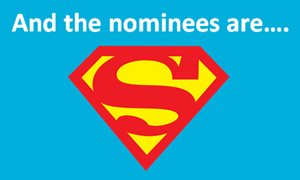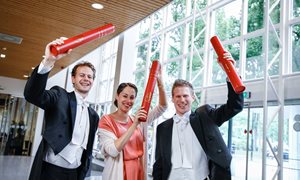 My name is Dimitri Diavatopoulos, I am Dutch, assistant professor at the Department of Laboratory Medicine, theme Infectious diseases and global health.
My name is Dimitri Diavatopoulos, I am Dutch, assistant professor at the Department of Laboratory Medicine, theme Infectious diseases and global health.
When you were a kid what did you want to be when you grew up? Can you tell us something about your child years.
I grew up in Lage Zwaluwe, a small town near the Biesbosch. I always wanted to be an astronaut when I grew up. This obviously didn’t work out, but if I ever get the opportunity I would still love to see Earth from space. When I first learned about DNA and cells from my biology teacher in high school I was completely hooked and since then I wanted to become a scientist.
What was your previous academic training, where did you study and why that study?
My undergraduate degree was in Bioprocess Engineering, which I chose mainly because it included a broad curriculum of molecular and cellular biology courses and there was a lot of freedom to pursue my interests. After that I obtained my PhD degree on whooping cough (kinkhoest) at the Utrecht University and the RIVM. I wanted to dive deeper into immunology so I moved to the University of Melbourne where I spent nearly 4 years working on the immunology of viral-bacterial co-infections.
The RIMLS motto is: ‘Today’s molecules for tomorrow’s medicine’. What does this mean for you?
Together with my group we are trying to understand how immune memory to respiratory infections is programmed, how memory evolves over time and how it can be reprogrammed. I am particularly interested in understanding the complex innate signalling networks induced by vaccination and infection and how these are translated into functional adaptive memory responses.
Who is your great example as scientists? And please give a motivation why.
There are many scientists that are a source of inspiration! If I have to name one, it would probably have to be David Schneider, who basically gave me a whole new perspective on how we can deal with infections, involving both tolerance and resistance mechanisms.
Which research discovery that you have made has made you most proud?
It’s probably not so much one discovery but what I am very proud of is my role in bringing together the key researchers in the field of pertussis and getting our consortium funded by the IMI and the Bill & Melinda Gates Foundation. This collaborative effort has really allowed the whole field to move forward, which will be instrumental in bringing pertussis back under control.
Given unlimited finance what experiment would you perform?
We are currently setting up controlled human infection models for different bacterial respiratory tract infections, so when given unlimited funding I would use it to answer some of the many biological questions that we have with these models, including the relationship between systemic and mucosal immunity.
What does your working area (desk, office) look like and what does it say about you (or your research)?
I go through phases, so it really depends. My desk can become cluttered but once every few weeks I take the effort to clean it up. At the moment it’s pretty much OK I think.
Nominate a colleague to be in the spotlight and what would you like to ask him or her?
I would like to nominate my colleague Gerben Ferwerda and ask him why everything always circles back to the type I interferons?
What type of person are you, quick insights:
a) Mac or PC? : PCb) Theater or cinema? : Cinema
c) Dine out or dine in? : Dine in
d) Ferrari or Fiat? : Ferrari…obviously
e) Shopaholic or chocoholic? : Neither
f) Culture or Nature : Nature
Related news items

Grants for research on magnesium deficiency and malaria Vidis for Felix Hol and Jeroen de Baaij
1 July 2022 Radboudumc researchers Jeroen de Baaij and Felix Hol both receive an NWO Vidi grant for their research, respectively on magnesium deficiency in type 2 diabetes and on malaria. go to page
Vote for the Supervisor of the year
12 December 2019 Deadline for voting is closed. The three nominated finalists are: Joost Drenth, Marien de Jonge and Iris Nagtegaal. go to page
RIMLS PhD grants awarded to eight RIMLS (j)PI's
12 September 2019 Recently, RIMLS held an internal call for Radboudumc junior researcher (PhD) positions. Congratulations for all the awardees and all the best in conducting the research projects. go to page
It is raining Horizon 2020 grants for RIMLS researchers
15 August 2019 Horizon 2020 is the biggest EU Research and Innovation programme ever with nearly €80 billion of funding available and running from 2014 to 2020. This summer, no less than 8 proposals for the Radboudumc have been accepted, 4 of them even as a coordinator. go to page

